Also in the letter:
■ Digital India gets Rs 15,000 crore boost
■ ETtech Done Deals
■ EV two-wheeler cos refund charger costs to buyers
Smartwatch firms in give-no-quarter price war for growth, market share
As the competition for supremacy in India’s smartwatch market intensifies, homegrown startups like Noise, Boat, Fire-Boltt, and Boult Audio are engaging in a fierce price battle to gain a stronger foothold. This is reminiscent of online smartphone sales from a few years ago, where a similar dynamic played out.
Declining prices: IDC’s latest report highlights a sharp drop in India’s smartwatch average selling price (ASP) by almost 45%, falling from $46.6 to $25.6 in just a year. This decline is attributed to reduced production costs and a strategic focus on lower-priced options to boost growth.
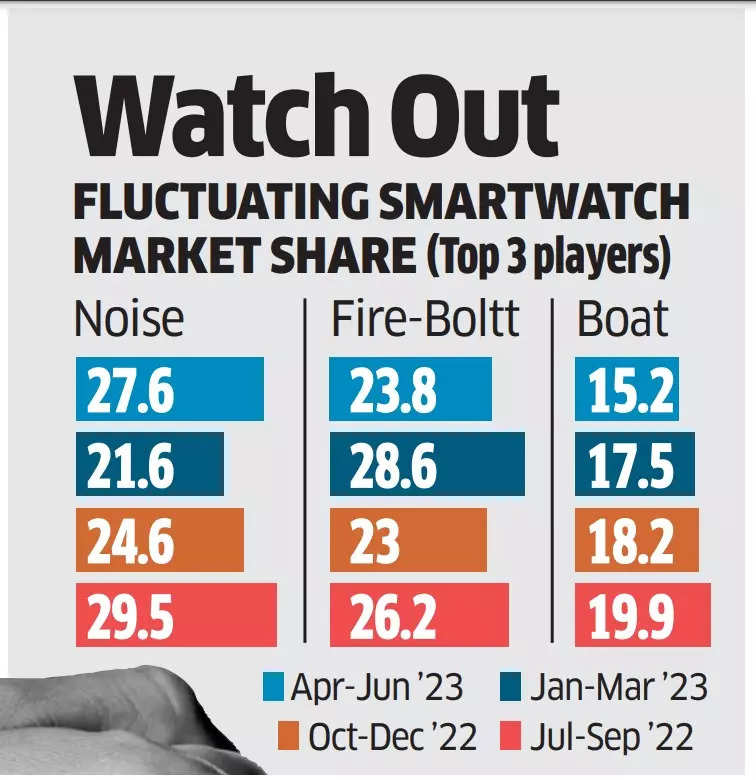
According to Counterpoint Research, the sub-Rs 2,000 retail price band captured 40% of the smartwatch market.
Major players: According to the latest report from IDC India, a research agency focusing on electronic devices, Gurgaon-based Noise has surged ahead, leading the pack in April-June with an impressive 27.6% market share in shipments. Hot on its heels, Fire-Boltt claimed a substantial 23.8% share, while Boat secured 15.2%. In the previous January-March quarter, Fire-Boltt had emerged as the frontrunner with a dominant 28.6% share.
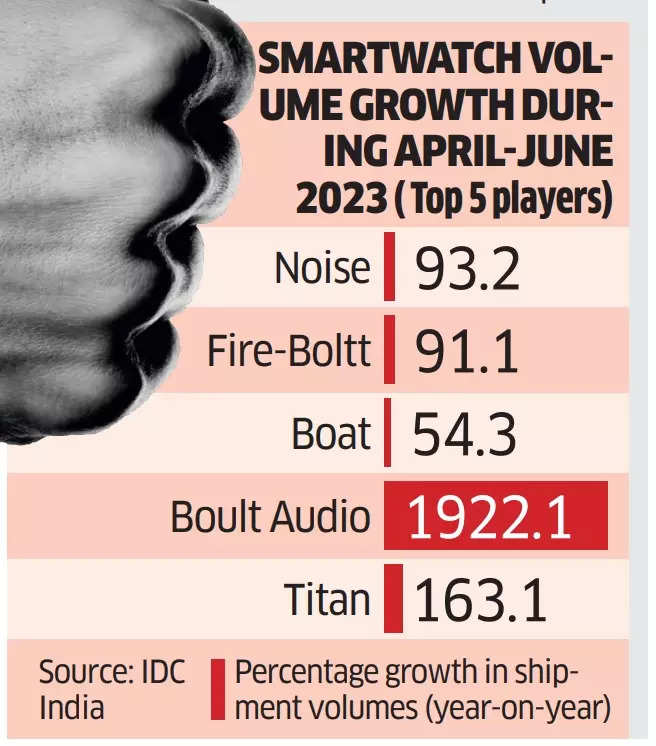
Even newer to the scene, Boult Audio managed to carve out a more significant space for itself, capturing 3.4% of the quarterly shipments in April-June 2023.
Quote unquote: “Customers are not so loyal to any brand unless they’ve already used the product…either in audio or smartwatches as a category. The supply is also getting cheaper by the day,” said Boult Audio’s founder and chief executive Varun Gupta.
Govt asks global IT hardware companies to up local value addition

The government is mulling how global electronic majors assembling products in India can increase value addition in the country to score brownie points under the IT production-linked incentive (PLI) scheme, sources told ETtech.
What does this mean? One of the main asks of the government is that industries operating in India look to implement new production techniques such as surface-mount technology (SMT) lines to step up local value-addition percentage, one of the sources said. The government expects value addition to increase to 60-80%.
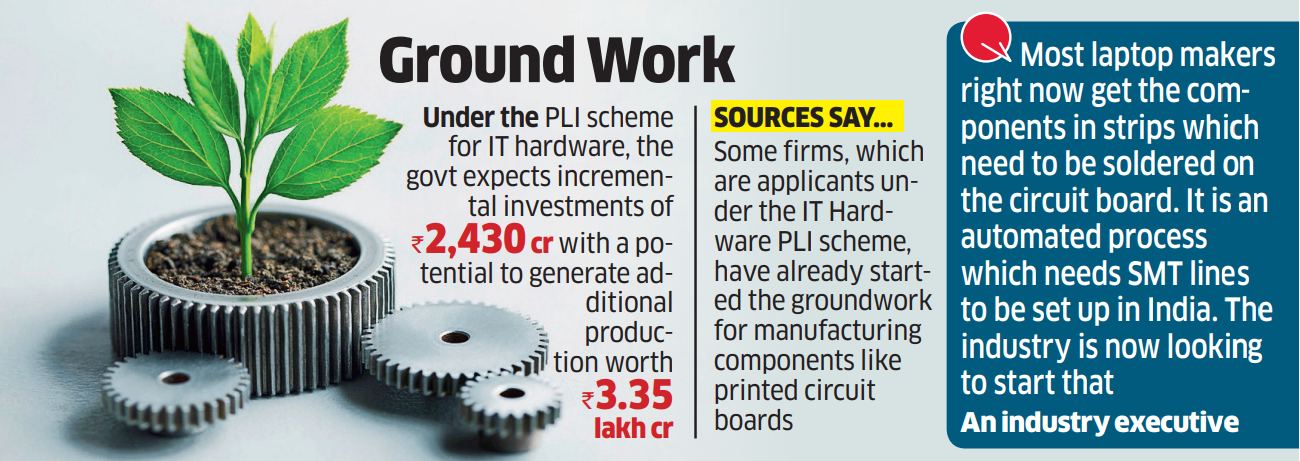
Explain it more: “So, for example, in the IT hardware PLI scheme, the government wants the industry to go beyond the assembly of components. Their ask is to make the printed circuit boards (PCBs) locally. If we make the motherboard here, that will give a big boost to local value addition,” an industry executive who attended a meeting with officials of the Ministry of Electronics and Information Technology told ET.
Work has already begun: Some companies have already hit the ground running to make components like PCBs locally. “The packaging, India-specific sockets, keycaps, panel covers and to an extent, even the display is being made here. Brands have various levels of expertise in localising these components,” one of the people said.
PLI scheme benefits: As per the PLI scheme for IT hardware, applicant companies can avail of additional incentives based on the percentage of localisation that they do.
Cabinet approves outlay of Rs 14,903 crore to expand Digital India

The Union Cabinet approved the extension of the Digital India scheme for a period of five years till 2025-26 with an outlay of Rs 14,903 crore, electronics and information technology Ashwini Vaishnaw announced on Wednesday.
Upskilling and more: Under the expansion, over 6.25 lakh IT professionals will be upskilled while 2.6 lakh will be trained in cybersecurity. The mobile-based Umang application will get 540 more services, adding to the current 1,700. Further, nine more supercomputers will be added to the National Supercomputing Mission, which already has 18 such supercomputers.
Bigger and better: “A lot of work has already happened on this. We were working on moulding and modifying existing schemes to make them better, bigger and more relevant to today’s requirements. That is why this programme has been extended,” Vaishnaw said.
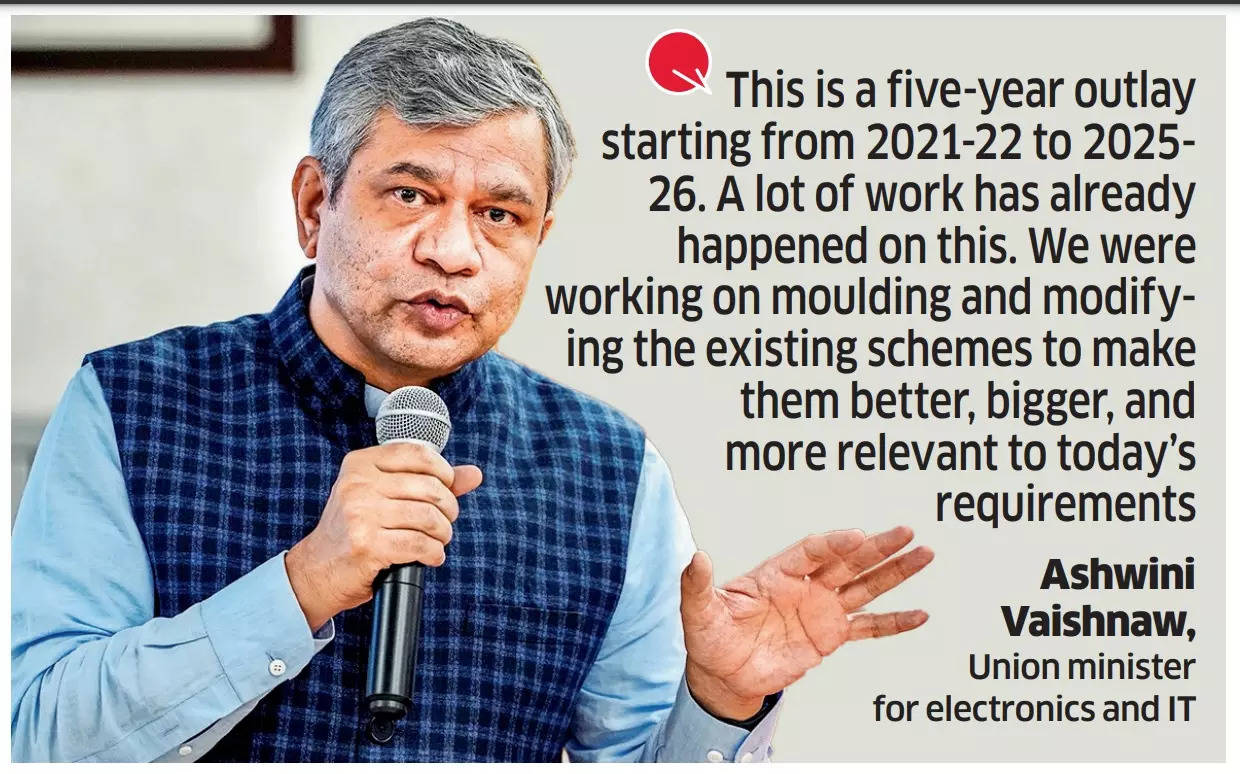
The minister added the government is also working on a digital credit model that would start working by the end of the year. In addition, there will be a DigiLocker for MSMEs to enable digital document verification and the government will also support 1,200 startups from tier-2 cities.
Focus on AI: Bhashini, the artificial intelligence (AI)-enabled multi-language translation tool (currently available in 10 languages), will be rolled out in all 22 scheduled languages. Also, three centres of excellence in AI on health, agriculture and sustainable cities will be set up by the government.
The Digital India scheme is an umbrella programme launched on July 1, 2015, and covers plans such as Aadhaar for all, country-wide rural broadband connectivity, common service centres, Bharat interface for money (BHIM), Aadhaar-enabled payments systems and MyGov.
ETtech Done Deals

Vaikkunth Mugunthan, cofounder & CEO, DynamoFL
Privacy-focused AI firm DynamoFL raises $15.1 million: Privacy-solutions provider for generative AI space, DynamoFL, has raised $15.1 million as a part of a fresh funding round, co-led by existing investor Nexus Venture Partners and Canapi Ventures.
The company said it will use the fresh raise to double down on its team strength, while bolstering its engineering capabilities across the machine learning domain, and strengthening its devops function. With the current infusion, DynamoFL has raised $19.3 million till date.
Nazara Technologies to invest over Rs 4 crore in Israeli game developer Snax Games: Listed gaming and media firm Nazara Technologies on Wednesday said it would invest $500,000 (Rs 4.15 crore) in Israel-based game developer Snax Games Ltd.
The investment would be made via its Singapore-based subsidiary Nazara PTE Ltd, the firm said. Nazara also entered an agreement to secure exclusive publishing rights for games made by Snax Games in the Indian subcontinent and the Middle-East region for five years, on a revenue-sharing basis. Following the deal, Nazara Singapore will have the right to acquire equity shares in Snax Games at a future date.
EV two-wheeler companies refund charger costs to buyers

Electric two-wheeler companies Ola Electric, Ather Energy, TVS Motor and Hero MotoCorp have coughed up around Rs 10 crore out of the over Rs 300 crore they owe to consumers for charging them for off-board costs.
Refund conundrum: The companies returned customers’ their money after the Ministry of Heavy Industries (MHI) found that they were in violation of the guidelines of the government scheme Faster Adoption and Manufacturing of (Hybrid &) Electric Vehicles in India (FAME India) by mispricing their vehicles.
The Centre offers a subsidy on the sale of locally made EVs under the FAME scheme. Under the FAME 2 scheme rules, electric scooters worth over Rs 1.50 lakh cannot be subsidised. These four companies were billing their charger and proprietary software as an add-on to the vehicles in a bid to lower the reported sale price of their products.
Other Top Stories By Our Reporters
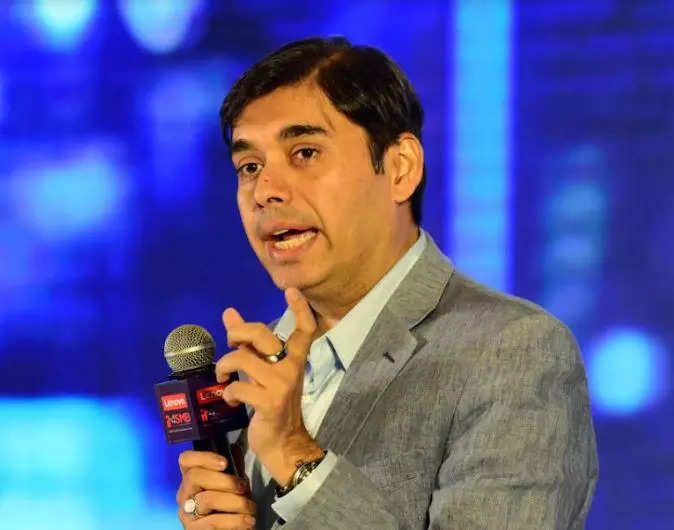
Naveen Tewari, founder and CEO, InMobi Group
InMobi acquires Quantcast Choice to manage consent for publishers: Marketing technologies provider InMobi announced the acquisition of Quantcast Choice, a consent management platform designed to help publishers align with global privacy regulations. This comes on the heels of India enacting its first privacy legislation, the Digital Personal Data Protection (DPDP) Act.
Bengaluru fresher hiring sentiment down by 10%, hit by slump in IT sector: However, Bengaluru companies still have the highest hiring intent for freshers in the country, followed by Mumbai at 61% and Chennai at 47%.
Global Picks We Are Reading
■ ‘Are you kidding, carjacking?’ – The problem with facial recognition in policing (The Guardian)
■ Bing, Bard, and ChatGPT: How AI is rewriting the internet (The Verge)
■ Meta’s Twitter rival Threads unravels (Financial Times)
























